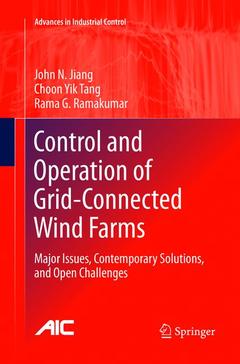Control and Operation of Grid-Connected Wind Farms, Softcover reprint of the original 1st ed. 2016 Major Issues, Contemporary Solutions, and Open Challenges Advances in Industrial Control Series
Auteurs : Jiang John N., Tang Choon Yik, Ramakumar Rama G.

At the individual-turbine level, a nonlinear controller based on feedback linearization, uncertainty estimation and gradient-based optimization is shown robustly to control both active and reactive power outputs of variable-speed turbines with doubly-fed induction generators. Heuristic coordination of the output of a wind farm, represented by a single equivalent turbine with energy storage to optimize and smooth the active power output is presented.
A generic approximate model of wind turbine control developed using system identification techniques is proposed to advance research and facilitate the treatment of control issues at the wind-farm level. A supervisory wind-farm controller is then introduced with a view to maximizing and regulating active power output under normal operating conditions and unusual contingencies. This helps to make the individual turbines cooperate in such as way that the overall output of the farm accurately tracks a reference and/or is statistically as smooth as possible to improve grid reliability.
The text concludes with an overall discussion of the promise of advanced wind-farm control techniques in making wind an economic energy source and beneficial influence on grid performance. The challenges that warrant further research are succinctly enumerated.
Control and Operation of Grid-Connected Wind Farms is primarily intended for researchers from a systems and control background wishing to apply their expertise to the area of wind-energy generation. At the same time, coverage of contemporary solutions to fundamental operational problems will benefit power/energy engineers endeavoring to promote wind as a reliable and clean source of electrical power.
Dr. ChoonYik Tang is an assistant professor in the School of Electrical and Computer Engineering at University of Oklahoma. Dr. Tang received the B.S. and M.S. degrees in mechanical engineering from Oklahoma State University, Stillwater, in 1996 and 1997, respectively, and the Ph.D. degree in electrical engineering from the University of Michigan, Ann Arbor, in 2003. Since 2006, he has been an Assistant Professor in the School of Electrical and Computer Engineering at the University of Oklahoma, Norman. His current research interests include systems and control theory, distributed algorithms for computation and optimization over networks, control and operation of wind farms, and computationally efficient digital filter design.
Dr. Rama Ramakumar is Regent Professor and PSO/Albrecht Naeter Professor and Director of the Engineering Energy Laboratory at the Oklahoma State University. Over his 41 year career in electric power engineering, Dr. Ramakumar has been primarily involved in renewable energy and energy systems research. He has authored a text book entitled “Engineering Reliability: Fundamentals and Applications” published by Prentice Hall and nearly 200 publications in
Moves the story of wind energy control up from the individual turbine to the level of the whole windfarm
Addresses the pressing need for reliable methods of integration of large-scale wind generation in powersystems world-wide
Provides a springboard for researchers and engineers from control and power backgrounds to address key issues arising from wind power integration together in further cooperative research
Includes supplementary material: sn.pub/extras
Date de parution : 05-2018
Ouvrage de 139 p.
15.5x23.5 cm
Date de parution : 06-2016
Ouvrage de 139 p.
15.5x23.5 cm



